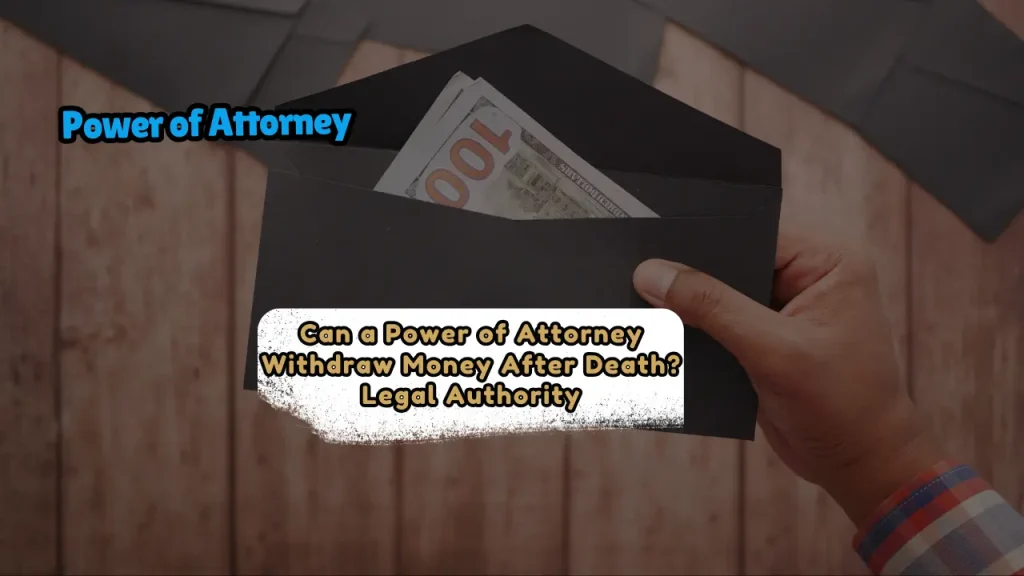Can a Power of Attorney Withdraw Money After Death? Legal Authority
No, a power of attorney (POA) cannot legally withdraw money from the principal’s accounts after their death. All authority granted under a POA ends immediately upon the principal’s death, and any post-death transactions may result in legal consequences.
Why a Power of Attorney Loses Authority After Death
A POA is strictly a tool to enable an agent to act on behalf of the principal during their lifetime. Once the principal dies, the POA becomes invalid immediately. As a result, financial institutions, legal entities, and courts no longer recognize the agent’s authority. This rule applies universally across all types of POAs, whether durable, non-durable, or limited. In other words, all authority under a POA expires at the moment the principal dies.
Table of Contents
Who Manages Finances After Death?
After death, control of the deceased’s assets shifts from the POA agent to the estate’s executor (if there is a valid will) or to an administrator appointed by the probate court (if there is no will). The executor or administrator is responsible for:
- Settling outstanding debts and taxes.
- Collecting and inventorying all assets.
- Distributing the remaining assets to the rightful heirs or beneficiaries according to the will or state intestacy laws.
Before these responsibilities are executed, the court verifies the will (if one exists) and issues Letters Testamentary—a legal document that officially grants the executor authority over the estate.
Exceptions: When Funds Can Still Be Accessed
Even though a POA agent loses authority at death, there are scenarios in which funds may still be accessed without using a POA:
- Joint Account Holders: A surviving co-owner of a jointly held bank account can continue to use the funds after the other owner dies.
- Trustees: If assets are held within a trust, the trustee manages them in accordance with the trust’s terms, bypassing the probate process.
- Beneficiaries: For accounts designated as payable-on-death (POD) or transfer-on-death (TOD), the funds pass directly to the named beneficiaries without going through probate.
Related article for you:
Is an Irrevocable Power of Attorney Valid After Death?

Legal Risks of Unauthorized Withdrawals
If a POA agent attempts to withdraw money or conduct any transactions after the principal’s death, they do so without legal authority. Such unauthorized actions can lead to:
- Civil Penalties: The agent may be required to repay the withdrawn amount along with additional damages to the estate.
- Criminal Charges: Depending on the jurisdiction, such acts can lead to charges of theft, fraud, or forgery, especially if there is evidence of intent to deceive.
- Probate Delays: Unauthorized transactions may spark disputes among heirs, complicating and delaying the estate’s settlement.
How to Protect the Estate
To safeguard the deceased’s financial assets and ensure that only authorized parties manage the estate, consider these steps:
- Notify Banks Immediately: Submit a certified death certificate to the financial institutions to freeze or secure the accounts.
- Initiate Probate: File the will (or, if there is no will, petition the court) to formally appoint an executor or administrator.
- Audit Financial Accounts: Review recent transactions carefully to identify any unauthorized activity.
- Update Estate Plans: Consider using trusts or designating joint accounts for critical assets to streamline asset transfer and avoid probate complications.
Best Practices in Estate Planning
To prevent any confusion or potential misuse, it is essential to plan ahead by:
- Establishing Clear Roles: Clearly differentiate between a POA (effective only during a principal’s lifetime) and the appointment of an executor or administrator (responsible for estate management after death).
- Regularly Reviewing Documents: Periodically update your POA, will, and other related estate planning documents to reflect any changes in circumstances.
- Communicating with Family: Ensure that trusted family members are aware of their roles and have access to all necessary legal documents to protect the estate.
Key Takeaway
A power of attorney agent’s rights dissolve immediately upon the principal’s death. Only the court-appointed executor or the legal heirs, as determined by a valid will or intestacy laws, have the authority to manage and distribute the deceased’s assets.
Unauthorized transactions made by a former POA agent can lead to serious legal repercussions. Always consult an estate planning or elder-law attorney to ensure that your documents comply with state laws and to protect the estate from potential financial mismanagement.
This article is for informational purposes only and does not constitute legal advice. Laws vary by jurisdiction—please consult a qualified legal professional for advice tailored to your situation.
About the Author

Sarah Klein, JD, is an experienced estate planning attorney who has helped clients with wills, trusts, powers of attorney, and probate matters. At All About Lawyer, she simplifies complex estate laws so families can protect their assets, plan ahead, and avoid legal headaches during life’s most sensitive moments.
Read more about Sarah
